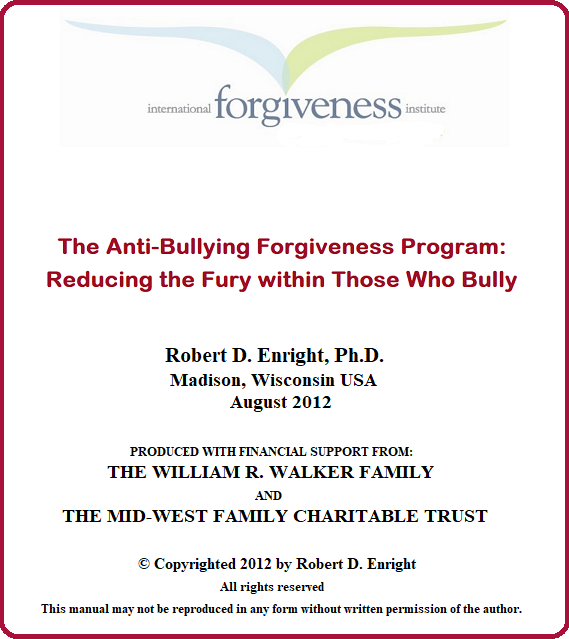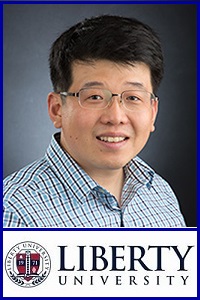Tagged: “Whole-school AntiBullying Programs”
Research Study in Spain Endorses Dr. Enright’s Anti-Bullying Forgiveness Program
A pioneering research study conducted with primary and secondary teachers and students in Spain has support for Dr. Robert Enright’s ideas on anti-bullying, which offers forgiveness education to those who do the bullying. His original Anti-Bullying Forgiveness Program is available on our website.
Two recommendations in the study in Spain are these:
1) That school administrators “incorporate education in forgiveness into bullying prevention programs;” and,
2) That “forgiveness-based education, as an empirically supported approach to reducing anger, may be one of the answers to peace within conflict zones and societies.”
The study, Evaluation of the effectiveness and satisfaction of the “Learning to Forgive” program for the prevention of bullying, was published this month in the Electronic Journal of Research in Educational Psychology. It was conducted by psychologists at the University of Murcia—one of the largest and oldest universities in Spain (established in 1272)—with technical and procedural guidance from Dr. Enright himself.
The “Learning to Forgive” program that was the focal point of the new study, was inspired by The Anti-Bullying Forgiveness Program developed by Dr. Enright in 2012 based on his now more than 35 years of research into forgiveness. Forgiveness education as a way of reducing excessive anger has been tested and used for more than 17 years in schools located in places such as Belfast, Northern Ireland, and more recently in Monrovia, Liberia (West Africa), Iran, and Pakistan.
The purpose of the antibullying forgiveness program is to help students, who bully others, to forgive those who have deeply hurt them. It is based on the understand that bullying behavior does not occur in a vacuum, but instead often results from a deep internal rage that is not originally targeted toward the victims of those who bully. In other words, those who bully oftentimes are displacing their built-up anger onto unsuspecting others.
To help those who bully to forgive is to reduce the excessive anger that can be a direct motivation for hurting others. In this way forgiveness can be a powerful approach to reducing repressed anger and eliminating bullying behavior.
“This program tries to change the typical understanding, often incomplete, that we usually have about forgiveness,” according to the study in Spain. “With a deeper understanding about what forgiveness is, then the students may show less resentment, fewer relationship breaks, and less unpleasant emotions over time. Teaching young people this more complete view of forgiveness might avoid, in the words of Enright himself, many sufferings in adulthood.”
Study participants consisted of 88 primary and secondary school teachers at 11 educational centers and 153 students at 4 educational centers. In Study 1 of the two-part research project, “statistically significant improvements were found in the forgiveness group regarding their knowledge of forgiveness and marginally significant in emotional forgiveness compared to the control group.”
In Study 2 participants noted “high satisfaction with the program and that it had helped them forgive in a remarkable way. In line with other studies, it is recommended to incorporate education in forgiveness into bullying prevention programs.”
According to the study authors, their research as well as other studies indicate that “forgiveness is a protective factor against emotional problems and prevents victims of harassment from now demonstrating bullying behavior toward others.” They also recommended adding in-depth modules for adults who could then provide in-home reinforcement in helping students achieve and maintain their forgiveness-related skills.
“The results of these two pioneering studies in Spain on the ‘Learning to Forgive’ Program inspired by the research of Robert Enright and his team show positive results, both in teachers and students,” the report concludes. “The promotion of interventions based on empathy, compassion, and forgiveness contribute to sowing the path of peaceful coexistence.”
Read the complete English translation of the Spanish bullying-prevention study.
Read the complete Spanish version of the study.
Learn more about The Enright Anti-Bullying Forgiveness Program:
- A School Anti-Bullying Program That Works
- The Anti-Bullying Forgiveness Program – FREE for a Limited Time
- Can We Get Anti-Bullying Programs to Work?
- Obtain the Anti-Bullying Forgiveness Program
A School Anti-Bullying Program That Works!
No one argues about the need to stop bullying in schools. Bullying’s adverse effects not only impact the child when the bullying occurs but typically impact a victim’s health and emotions throughout the person’s lifetime (see “The Impact of Bullying” box below).
That reality has become a growing topic of concern in the academic community with bullying being cited as a universal problem in countries around the world. Over the past several decades, literally hundreds of school-wide anti-bullying programs have been developed and implemented. That raises the question, of course: Do school antibullying programs work?
The typical answer from those professionals studying that question is: “Not so well. We need to do better.”
And sure enough, that’s the inauspicious conclusion of a just-completed systematic review of scientific publications covering the past 20 years. According to the study, Whole‐school Antibullying Interventions, a full 50% of all the school programs reviewed failed to “show significant effects on bullying prevalence” or found negative results including an actual increase in bullying.
The study, published in April by the peer-reviewed journal Psychology in the Schools, was conducted by university researchers in Brazil. While their study found that anti-bullying interventions resulted in increased reporting of bullying occurrences (with resultant increases in the use of punitive discipline), at the same time many of the programs failed totally–primarily due to inadequate time for training and implementation as well as lack of support.

Dr. Jichan J. Kim
Those findings come as no surprise to many psychologists. In fact, the report actually documented and reinforced what educational psychologist Dr. Jichan J. Kim first reported more than four years ago in his University of Wisconsin-Madison doctoral thesis: The Effectiveness of a Forgiveness Intervention Program on Reducing Adolescents’ Bullying Behavior.
Dr. Kim’s thesis includes a 29-page literature review in which he documents the unusually large number of research projects demonstrating the ineffectiveness of most school-wide anti-bullying programs including:
- A 2007 review of 45 separate school-based anti-bullying studies involving 34,713 individuals that concluded “the positive changes were too small to be supported as significant;”
- Another 2007 examination of 16 major anti-bullying programs across 11 different countries that showed mixed results with less than half the programs demonstrating desirable effects;
- A 2008 evaluation of 16 studies across 6 nations involving a total of 15,386 K-12 students that showed the interventions tended to influence students’ attitudes and self-perceptions but not their bullying behavior; and,
- Studies completed in 2012, 2014, and 2015 (one involving 560 school psychologists and school counselors) supporting the lack of evidence-based interventions.
Despite all the negative assessments he uncovered, Dr. Kim believes there is one approach that might be effective–helping adolescents exhibiting bullying behavior to forgive those who have offended them in the past. That approach, Dr. Kim says, is still not widely used and is, therefore, still not a compelling component of the scientific literature although he is confident it “can be beneficial.”

Dr. Robert D. Enright
That intervention approach, in fact, is the one advocated in The Anti-Bullying Forgiveness Program developed more than 8 years ago by Dr. Robert Enright, founder of the International Forgiveness Institute. The program not only incorporates lessons-learned from Dr. Enright’s more than 40-years of forgiveness research, it also integrates the scientifically-quantifiable forgiveness process he developed and , perhaps most importantly, it focuses directly on the one doing the bullying.
“Those who bully usually have pent-up anger and as a result they displace their own wounds onto others,” Dr. Enright explains. “Our program is meant to take the anger out of the heart of those who bully so that they no longer bully others.”
Dr. Enright says his research has taught him to take an approach that may seem counter-intuitive today, but will appear obvious to many in the future: “Yes, help the victim, but also help the one who is bullying to get rid of his or her anger, which is fueling the bullying. Those who bully have been victimized by others. Help them to reduce their resentment toward those who were the victimizers and the bullying behavior will melt away.”
- Learn more about Dr. Enright’s Anti-Bullying Forgiveness Program.
- Learn more about Dr. Jichan Kim, an Assistant Professor of Psychology at Liberty University in Lynchburg, VA. (Disclosure: Dr. Enright was Jichan Kim’s graduate school adviser).
- Read a review of Forgiveness Therapy.
- Learn more about the long-term impacts of bullying in the 2014 British Study.
- Learn how bullying statistics compare in your state versus others, with this interactive Bullying-Cyberbullying-Sexting Map of the U.S.
- Learn about bullying and cyberbullying in your country with this interactive International Research on Bullying Map of the World.



